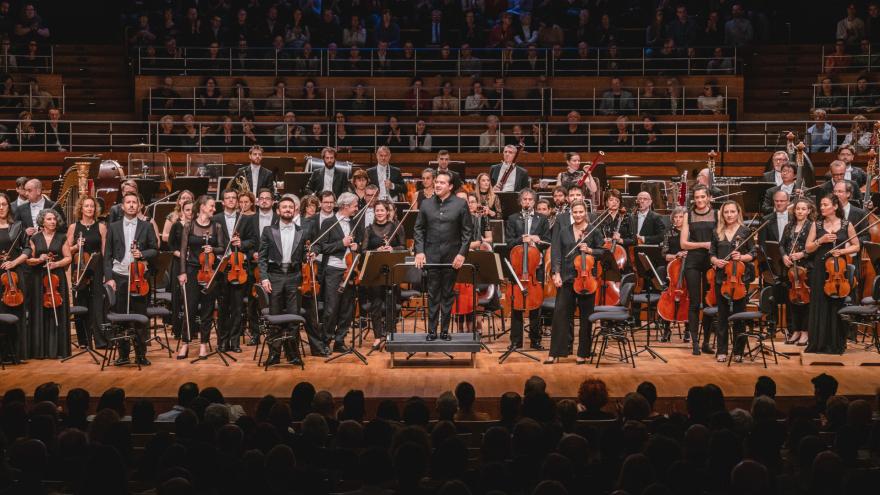The Basque National Orchestra seals its relationship with the prestigious Beethoven Festival in Poland

It is the result of a high-paced and artistically demanding tour that the Basque orchestra has managed with great solidity and high standards of quality.
"We have sealed the possibility of returning in the future", says Oriol Roch, general director of the Basque National Orchestra.
The Basque National Orchestra has had an international calling in its DNA since it was launched 41 years ago. During this time, it has travelled to many European countries and also to South American lands, but this new European departure, which makes it number 22, has been a turning point in its international career. Poland is an example of musical tradition with capital letters, a cradle of great artists, composers and centenary orchestras, and the Beethoven Festival, to which the orchestra has been invited as a result of its relationship with chief conductor Robert Trevino, has become, thanks to its founder Krzysztof Penderecki, one of the most important in Poland. The expectation to welcome the Basque National Orchestra was high and Warsaw, Wroclaw, Krakow and Katowice were already waiting with 5,400 tickets sold. With this background, the Basque National Orchestra not only could not fail, but also had to turn up with a demanding, high-level programme, and also pull it off with solvency.
A demanding programme
The programme designed for this presentation in Poland has been the same for all four concerts. As an opening, the popular and universal Boléro, signed by a composer, Ravel, that we claim as Basque and that the Basque National Orchestra has the power to show with an air and gaze of its own. And it is here that the orchestra has begun its conquest with the public, responding to Ravel's whims and knowing how to incorporate the different instrumental families in crescendo mode, as the score demands, always with great success and displaying the most Basque side of the composer. From the very first bars, with Ravel's Pavane pour une infante défunte as an overture, the Basque National Orchestra marked its territory and won over an expectant audience before whom it presented what was undoubtedly the main part of the concert, Mahler's complex Symphony No. 5. 70 minutes of score provide space to get to know the whole sonic universe of a composer, but also to test an orchestra's capacity. The challenge was great, but the Basque National Orchestra has met it with great solidity, confidence in its work, concentration and high standards of quality. The response of the audience with long standing ovations has had a big impact on the orchestra, which has responded with two and even three encores, completing almost three hours of concert in each city. Jesús Guridi's Amorosa, the Intermedio from Las Bodas de Luis Alonso by Gerónimo Giménez and Brahms' Hungarian Dance No. 5 were the scores that the orchestra kept on the lectern to close each evening and used to leave the audience with a historic memory.
In the words of Robert Trevino, "the musicians have huge doses of passion, power and enthusiasm. They have played this symphony four times in front of many people and have worked hard to achieve the best sound and depth in the performance. All this makes me very proud to be the chief conductor of the Basque National Orchestra. The orchestra has shown itself to be at a very high level".
After the Basque National Orchestra's visit to the cities of Warsaw, Wroclaw, Krakow and Katowice, "we can say that we have established an important relationship with the Beethoven Festival and that we have already sealed the possibility of returning in the future", says Oriol Roch, general director of the Basque National Orchestra.
Concert halls that combine tradition and modernity
The halls we have visited have been a combination of tradition and modernity. Warsaw and Krakow are historic places, the former rebuilt after World War II, the latter with centuries-old walls, and both steeped in the history of great composers and performers, legends who have woven the musical history of Poland and who enable us to live their tradition today with absolute respect and admiration. The auditoriums in Wroclaw and Katowice are also very important places built later, in avant-garde architecture, with the best acoustics and made into the best concert halls, it is said, in the whole world. The Basque National Orchestra has passed through these halls, marking a new international milestone and honouring its status as a Basque cultural ambassador.
Institutional representation, family and friends
Over the last few days, many people and institutional representatives have accompanied the Basque National Orchestra on its presentation in Poland. The Warsaw concert was attended by the president of the Beethoven Festival, Elzbieta Penderecka. The Basque Government's Minister of Health, Gotzone Sagardui, opened the Basque institutional representation in Warsaw together with Javier García Cogorro, CEO of Viralgen, the company sponsoring the concert in the Polish capital, where they carry out important work in the field of genetic research. The Krakow concert was attended by the Mayor of Krakow's Plenipotentiary for Culture, Robert Piaskowski; the Polish Consul in Burgos, Enrique de Villamor y Soraluce; the Director of the Cervantes Institute, Beatriz Hernanz; and Polish conductor Antoni Wit, for several years the chief conductor of the Navarre Symphony Orchestra and today honorary conductor of the Krakow Philharmonic Orchestra. Along with this representation, the Basque National Orchestra was also accompanied by countless relatives of its Polish musicians, numerous friends of members of the orchestra, as well as 'Basques around the world' and young people on Erasmus courses attracted by the presence of the Basque National Orchestra in their adopted Polish cities.
Katowice, end of the tour
The Basque National Orchestra ends its tour today in Katowice, an industrial city with a mining tradition that is home to one of the most important auditoriums with the best acoustics in Europe. It is there that the orchestra will seal this grand tour of four concerts in Poland, which will have an important place in its international history.
Photos from the tour
Concerts & Tickets February














